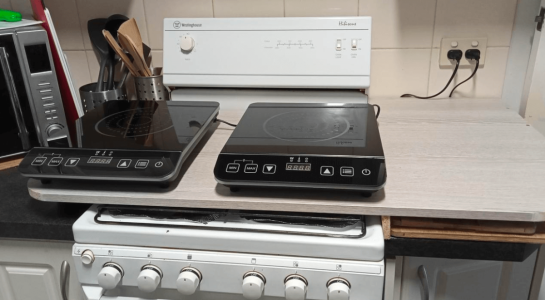Outrage as woman shares Kmart advice to overcome landlord's repair refusal: 'This is the state of our rental market'
- Replies 9
Every now and then, we stumble upon a piece of advice that we think is worth sharing here at the Seniors Discount Club—particularly when it's about finding clever ways to make life a little bit easier.
However, in this instance, we'd like to focus on addressing an issue that has caused quite a stir among social media users rather than sharing the advice itself.
Recently, a woman took to the Kmart Hacks and Decor Facebook page to share a 'trick' she'd come up with to replace the stove in her rental property after her landlord refused to fix it.
'Our landlord won't fix the old stove, so we improvised,' she wrote. She then shared a photo of a melamine board placed on top of the malfunctioning stove, with two induction cookers from Kmart positioned above it.
'So far, they work very well and have cut down on cooking time,' she went on to say.

To her surprise, instead of receiving praise for her ingenious workaround, the post attracted hundreds of outraged comments from fellow group members. Many of them pointed out that the landlord had a legal obligation to repair the stove, regardless of the clever Kmart fix the tenant had devised.
'Wait, what? Won't fix the stove? They have to; that's a breach,' one woman commented.
'I hope the homeowner has been reported to RTA, plus the real estate has also got a legal obligation to make sure the rental property is compliant,' said another.
'The law states that everything within a rental property has to be within sound working order. I'd be reporting the owner.'
Some commenters even shared their own experiences with faulty appliances in their rental properties: 'This is the state of our woeful rental market – I'm sorry you have to deal with this,' one member said.
'I lived like this for about five years in a rental, too!' added another.
Several others urged the woman to take legal action, with one person stating, 'Not sure what state you're in, but in Queensland, it's an emergency repair. As a landlord, it's classified as a necessity and must be fixed.'
In addition to the legal implications, there were concerns raised about the safety of the makeshift setup.
If not mounted correctly, the melamine board and induction cookers could fall, causing potential injuries in the kitchen. With that in mind, we discourage our readers from trying this workaround.

The legal process for addressing unresponsive landlords
Now you might be wondering: How does one go about addressing the issue when faced with an unresponsive landlord? Luckily, there is a legal process in place to help tenants handle such situations.
First and foremost, as a tenant, it's crucial to know your rights. In most states, the law requires landlords to provide and maintain their rental properties in a safe and habitable condition.
This includes ensuring that essential appliances, such as stoves, heaters, and hot water systems, are in good working order. Failing to do so not only goes against this general obligation but can also be seen as a breach of the rental agreement.

If you find yourself in a situation where your landlord isn't addressing the issue, your first step should be to notify them in writing. Make sure to keep a copy of the correspondence, as you may need it further down the track if the issue remains unresolved.
It's a good idea to give your landlord a reasonable timeframe to remedy the situation, such as two weeks. If the landlord still fails to respond, it might be time to escalate the matter.
Depending on the state you reside in, different regulatory bodies handle tenancy disputes. Some examples include the Residential Tenancies Authority (RTA) in Queensland, Consumer Affairs Victoria (CAV) in Victoria, and the NSW Civil and Administrative Tribunal (NCAT) in New South Wales.
Contacting one of these organisations will allow you to seek guidance on the next steps in resolving your dispute with the landlord. You might be advised to submit a formal tenancy complaint or request a mediation session to attempt to resolve the matter amicably.
In some cases, if all else fails, you may need to consider taking legal action. While this might seem like a daunting step, remember that there are organisations and resources that can assist you in navigating this process, such as community legal centres and tenant advocacy groups.
So next time you're faced with a landlord who's shirking their responsibilities, keep in mind that there are processes in place to protect your rights as a tenant. Don't feel trapped in taking dangerous shortcuts to address issues in your rental property – knowledge is power! Stay informed and know your rights, and you'll be better equipped to handle those less-than-ideal situations with grace and confidence.
Have you ever been in this situation before? What did you do?
However, in this instance, we'd like to focus on addressing an issue that has caused quite a stir among social media users rather than sharing the advice itself.
Recently, a woman took to the Kmart Hacks and Decor Facebook page to share a 'trick' she'd come up with to replace the stove in her rental property after her landlord refused to fix it.
'Our landlord won't fix the old stove, so we improvised,' she wrote. She then shared a photo of a melamine board placed on top of the malfunctioning stove, with two induction cookers from Kmart positioned above it.
'So far, they work very well and have cut down on cooking time,' she went on to say.

A woman's kitchen setup caused a stir on social media when she shared her frustrating experience with a stubborn landlord who refused to repair an appliance. Credit: Facebook/Kmart Hacks and Decor.
To her surprise, instead of receiving praise for her ingenious workaround, the post attracted hundreds of outraged comments from fellow group members. Many of them pointed out that the landlord had a legal obligation to repair the stove, regardless of the clever Kmart fix the tenant had devised.
'Wait, what? Won't fix the stove? They have to; that's a breach,' one woman commented.
'I hope the homeowner has been reported to RTA, plus the real estate has also got a legal obligation to make sure the rental property is compliant,' said another.
'The law states that everything within a rental property has to be within sound working order. I'd be reporting the owner.'
Some commenters even shared their own experiences with faulty appliances in their rental properties: 'This is the state of our woeful rental market – I'm sorry you have to deal with this,' one member said.
'I lived like this for about five years in a rental, too!' added another.
Several others urged the woman to take legal action, with one person stating, 'Not sure what state you're in, but in Queensland, it's an emergency repair. As a landlord, it's classified as a necessity and must be fixed.'
In addition to the legal implications, there were concerns raised about the safety of the makeshift setup.
If not mounted correctly, the melamine board and induction cookers could fall, causing potential injuries in the kitchen. With that in mind, we discourage our readers from trying this workaround.
Key Takeaways
- A woman's Kmart advice for replacing a broken stove in her rental property went viral and sparked outrage.
- She posted her improvised solution of using a melamine board and two induction cookers from Kmart, but commenters focused on the landlord's refusal to fix the stove.
- Many commenters highlighted the legal obligation of landlords and property owners to maintain appliances in working order.
- Concerns were raised not only about the rental market in Australia but also about the safety risks of the improvised stove setup.
The legal process for addressing unresponsive landlords
Now you might be wondering: How does one go about addressing the issue when faced with an unresponsive landlord? Luckily, there is a legal process in place to help tenants handle such situations.
First and foremost, as a tenant, it's crucial to know your rights. In most states, the law requires landlords to provide and maintain their rental properties in a safe and habitable condition.
This includes ensuring that essential appliances, such as stoves, heaters, and hot water systems, are in good working order. Failing to do so not only goes against this general obligation but can also be seen as a breach of the rental agreement.

It's important to properly read and understand your tenant rights before entering a tenancy agreement. Credit: Pexels/Ketut Subiyanto.
If you find yourself in a situation where your landlord isn't addressing the issue, your first step should be to notify them in writing. Make sure to keep a copy of the correspondence, as you may need it further down the track if the issue remains unresolved.
It's a good idea to give your landlord a reasonable timeframe to remedy the situation, such as two weeks. If the landlord still fails to respond, it might be time to escalate the matter.
Depending on the state you reside in, different regulatory bodies handle tenancy disputes. Some examples include the Residential Tenancies Authority (RTA) in Queensland, Consumer Affairs Victoria (CAV) in Victoria, and the NSW Civil and Administrative Tribunal (NCAT) in New South Wales.
Contacting one of these organisations will allow you to seek guidance on the next steps in resolving your dispute with the landlord. You might be advised to submit a formal tenancy complaint or request a mediation session to attempt to resolve the matter amicably.
In some cases, if all else fails, you may need to consider taking legal action. While this might seem like a daunting step, remember that there are organisations and resources that can assist you in navigating this process, such as community legal centres and tenant advocacy groups.
So next time you're faced with a landlord who's shirking their responsibilities, keep in mind that there are processes in place to protect your rights as a tenant. Don't feel trapped in taking dangerous shortcuts to address issues in your rental property – knowledge is power! Stay informed and know your rights, and you'll be better equipped to handle those less-than-ideal situations with grace and confidence.
Have you ever been in this situation before? What did you do?







